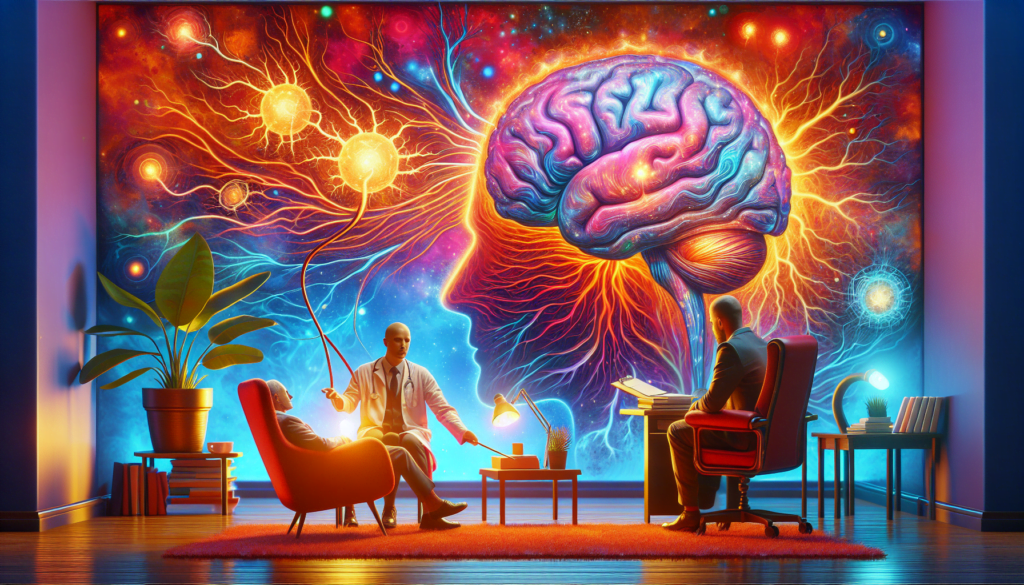Abnormal psychology, a fascinating realm of study, delves into the mysteries of atypical behaviors, emotions, and thoughts. It’s a field that helps us understand the complexities of mental health, offering insights into the causes, symptoms, and treatments of psychological disorders. Intrigued? Stay with us as we journey through the labyrinth of abnormal psychology, shedding light on its historical perspectives, theories, modern concepts, and treatment approaches.
Key Takeaways
- Abnormal psychology is a crucial field in understanding mental health.
- Historical perspectives of abnormal psychology have shaped our understanding of mental disorders.
- Various theories explain abnormal behavior, from supernatural to biological and psychological explanations.
- Modern concepts in abnormal psychology emphasize the interaction of genetic and environmental factors.
- Abnormal psychology plays a significant role in the classification and diagnosis of mental disorders.
- Treatment approaches in abnormal psychology range from psychoanalysis to cognitive-behavioral therapy.
- Abnormal psychology is significant in understanding mental illness, treatment strategies, and destigmatizing mental health issues.
Introduction to Abnormal Psychology
Definition and Scope
Abnormal psychology is a branch of psychology that studies unusual patterns of behavior, emotion, and thought, which may or may not be understood as precipitating a mental disorder. It’s a field that seeks to understand the nature of these abnormalities, their causes, and their impact on individuals’ lives.
Importance in Understanding Mental Health
Abnormal psychology plays a pivotal role in understanding mental health. It provides a framework for identifying and treating mental disorders, contributing to the overall well-being of individuals and society. By studying abnormal psychology, we can better comprehend the complexities of the human mind and the diverse experiences of mental health.

Historical Perspectives of Abnormal Psychology
Ancient Theories of Humors
The study of abnormal psychology dates back to ancient times. The Greeks and Romans, for instance, believed in the theory of humors. They thought that an imbalance in bodily fluids—blood, black bile, yellow bile, and phlegm—caused abnormal behavior.
Establishment of Asylums
During the Middle Ages, the perception of mental illness shifted towards a more supernatural explanation, leading to the establishment of asylums. These institutions, however, were more like prisons than treatment centers, reflecting society’s fear and misunderstanding of mental illness.
Deinstitutionalization Movement
The 20th century saw a significant shift in the treatment of mental illness with the deinstitutionalization movement. This movement aimed to move people with mental illness out of asylums and into community-based treatment programs, marking a significant step towards humanizing mental health care.

Theories Explaining Abnormal Behavior
Supernatural Explanations
Throughout history, supernatural explanations have often been used to account for abnormal behavior. These explanations typically involve the belief in demonic possession, witchcraft, or divine punishment.
Biological Explanations
Genetic Influences
Biological explanations for abnormal behavior focus on genetic and neurobiological factors. Research has shown that certain mental disorders, such as schizophrenia and bipolar disorder, have a genetic component, making individuals with a family history of these disorders more susceptible.
Neurobiological Factors
Neurobiological factors, such as imbalances in neurotransmitters or structural abnormalities in the brain, can also contribute to abnormal behavior. For instance, depression has been linked to low levels of serotonin, a neurotransmitter that regulates mood.
Psychological Explanitions
Irrational Beliefs
Psychological explanations for abnormal behavior focus on cognitive processes and emotional responses. For example, irrational beliefs—unrealistic or distorted thoughts—can lead to emotional distress and abnormal behavior.
Cognitive Distortions
Cognitive distortions, such as overgeneralization or catastrophizing, can also contribute to abnormal behavior. These distorted thought patterns can lead to negative emotions and maladaptive behaviors.
Sociocultural Influences
Sociocultural influences, including societal norms and cultural expectations, can also play a role in abnormal behavior. For instance, behaviors that deviate from societal norms may be labeled as abnormal, even if they do not cause distress or impairment.

Modern Concepts and Multiple Causality
Biopsychosocial Model
The biopsychosocial model is a modern concept in abnormal psychology that emphasizes the interaction of biological, psychological, and social factors in understanding abnormal behavior. This model suggests that mental disorders result from a complex interplay of these factors, rather than a single cause.
Diathesis-Stress Model
The diathesis-stress model is another modern concept that explains how vulnerabilities or predispositions (diatheses) interact with stressful life events or circumstances to produce mental disorders.
Interaction of Genetic and Environmental Factors
Modern concepts in abnormal psychology also highlight the interaction of genetic and environmental factors. For instance, while genetic factors may make an individual susceptible to a mental disorder, environmental factors—such as traumatic experiences or chronic stress—may trigger the onset of the disorder.

Classification and Diagnosis
DSM-5
The Diagnostic and Statistical Manual of Mental Disorders (DSM-5) is a widely used tool for the classification and diagnosis of mental disorders. It provides standardized criteria for diagnosing mental disorders, helping clinicians to accurately identify and treat these conditions.
ICD-10/ICD-11
The International Classification of Diseases (ICD-10/ICD-11) is another tool used for the classification and diagnosis of mental disorders. Developed by the World Health Organization, the ICD provides a comprehensive list of diseases, including mental and behavioral disorders.
Criteria for Mental Disorders
The criteria for diagnosing mental disorders typically include symptoms that cause significant distress or impairment in daily functioning. These symptoms must also be persistent, not attributable to substance use or another medical condition, and not better explained by another mental disorder.

Perspectives in Abnormal Psychology
Genetic Perspectives
Genetic perspectives in abnormal psychology focus on how genes influence the development of mental disorders. Research in this area has identified specific genes associated with certain mental disorders, providing insights into their biological basis.
Biological Causal Factors
Neurotransmitter Imbalances
Biological causal factors in abnormal psychology include neurotransmitter imbalances and abnormalities in brain structure and functioning. For instance, imbalances in neurotransmitters such as serotonin, dopamine, and norepinephrine have been linked to various mental disorders.
Brain Structure and Functioning
Abnormalities in brain structure and functioning can also contribute to mental disorders. For example, research has shown that individuals with schizophrenia often have structural abnormalities in the brain, such as enlarged ventricles.
Socio-Cultural Factors
Family Dynamics
Socio-cultural factors in abnormal psychology include family dynamics and cultural expectations. For instance, dysfunctional family dynamics, such as high levels of conflict or poor communication, can contribute to the development of mental disorders.
Cultural Expectations
Cultural expectations can also influence mental health. For example, societal pressure to conform to certain gender roles or beauty standards can lead to mental health issues such as body dysmorphic disorder or eating disorders.
Systemic Factors
Healthcare Access
Systemic factors, such as access to healthcare and social support systems, can also impact mental health. For instance, individuals without access to quality mental health care may struggle to manage their mental health conditions effectively.
Social Support Systems
Social support systems, including family, friends, and community resources, can play a crucial role in mental health. A strong social support system can provide emotional support, practical assistance, and a sense of belonging, which can help individuals cope with mental health issues.
Biopsychosocial Factors
Biopsychosocial factors in abnormal psychology encompass biological, psychological, and social factors. This perspective emphasizes the complex interplay of these factors in the development and maintenance of mental disorders.
Treatment Approaches in Abnormal Psychology
Psychoanalysis
Psychoanalysis, a treatment approach developed by Sigmund Freud, aims to uncover unconscious conflicts and impulses that contribute to abnormal behavior. This approach involves techniques such as free association and dream analysis to explore the unconscious mind.
Behavioral Therapy
Behavioral therapy focuses on changing maladaptive behaviors through techniques such as classical conditioning and operant conditioning. This approach is often used to treat conditions such as phobias, obsessive-compulsive disorder, and attention-deficit/hyperactivity disorder.
Humanistic Therapy
Humanistic therapy, influenced by theorists like Carl Rogers and Abraham Maslow, emphasizes personal growth and self-actualization. This approach encourages individuals to explore their feelings and take responsibility for their thoughts and actions.
Cognitive Behavioral Therapy (CBT)
Cognitive-behavioral therapy (CBT) is a widely used treatment approach in abnormal psychology. CBT focuses on changing maladaptive thought patterns and behaviors to improve emotional regulation and develop personal coping strategies.
Family Systems Therapies
Family systems therapies view the family as a system and focus on improving family dynamics and communication. These therapies can be particularly effective for treating conditions that affect the family system, such as substance abuse or eating disorders.

Professional Roles within Abnormal Psychology
Clinical Social Worker
Clinical social workers provide mental health services, including assessment, diagnosis, treatment, and prevention of mental illness. They often work in a variety of settings, including hospitals, mental health clinics, and private practice.
Clinical Psychologist
Clinical psychologists diagnose and treat mental, emotional, and behavioral disorders. They use a variety of treatment approaches, including psychotherapy, to help individuals manage their mental health issues.
Research Psychologist
Research psychologists conduct research to understand the causes and effects of mental disorders. Their work contributes to the development of new treatment approaches and prevention strategies.
Forensic Psychologist
Forensic psychologists apply psychological principles to the legal system. They often work in areas such as criminal profiling, competency evaluations, and child custody evaluations.
Neuropsychologist
Neuropsychologists specialize in understanding the relationship between the brain and behavior. They often work with individuals who have suffered brain injuries or have neurological conditions.
The Significance of Abnormal Psychology
Understanding Mental Illness
Abnormal psychology plays a crucial role in understanding mental illness. By studying abnormal behavior and mental disorders, we can gain insights into the causes, symptoms, and treatments of these conditions.
Treatment and Intervention Strategies
Abnormal psychology also contributes to the development of effective treatment and intervention strategies. These strategies can help individuals manage their mental health issues and improve their quality of life.
Destigmatization of Mental Health Issues
Abnormal psychology can also play a role in destigmatizing mental health issues. By increasing our understanding of mental disorders, we can challenge misconceptions and reduce the stigma associated with mental illness.
Advancements in Research Methods
Finally, abnormal psychology contributes to advancements in research methods. These advancements can lead to more accurate diagnoses, more effective treatments, and ultimately, better outcomes for individuals with mental disorders.
In conclusion, abnormal psychology is a field that offers valuable insights into the complexities of mental health. It helps us understand the causes and consequences of mental disorders, and provides effective strategies for treatment and intervention. So, whether you’re a student, a mental health professional, or simply someone interested in understanding the human mind, the study of abnormal psychology is a journey worth embarking on.
For more insights into psychology, check out our articles on psychological disorders, social psychology, and positive psychology. If you’re interested in how psychologists study behavior and mental processes, you might find this article on psychological research methods useful. And if you’re curious about psychoanalysis, don’t miss our article on what is psychoanalysis and how does it work.
For more information on abnormal psychology, you can also visit these external sources: Wikipedia, Open Text WSU, Lumen Learning, Online Psychology Degrees, and APA.
Curious Minds Welcome: Dive into the Intriguing World of Abnormal Psychology FAQ
What is abnormal psychology?
Abnormal psychology is a branch of psychology that studies unusual patterns of behavior, emotion, and thought, which may or may not be understood as precipitating a mental disorder. It aims to understand the nature of these abnormalities, how they develop, and how they can be treated. This field encompasses a wide range of psychological issues, from mild disturbances to severe mental illnesses.
How is ‘abnormal’ defined in the context of abnormal psychology?
In abnormal psychology, ‘abnormal’ refers to behavioral, emotional, or cognitive patterns that are atypical, significantly deviate from societal norms, and may impair functioning. It’s important to note that the definition of abnormality is complex and can vary across cultures and contexts. It often involves a combination of statistical rarity, violation of norms, personal distress, and functional impairment.
What are some common disorders studied in abnormal psychology?
Abnormal psychology covers a broad spectrum of disorders, including mood disorders like depression and bipolar disorder, anxiety disorders such as generalized anxiety disorder and PTSD, psychotic disorders like schizophrenia, personality disorders, eating disorders, and neurodevelopmental disorders like autism spectrum disorder and ADHD.
What causes mental disorders according to abnormal psychology?
The causes of mental disorders are multifaceted and often include a combination of genetic, biological, psychological, and environmental factors. Abnormal psychology explores these causes through various models, including the medical model, the psychodynamic model, the cognitive-behavioral model, and the diathesis-stress model, which suggests that a predisposition to a disorder may be triggered by stress.
How does abnormal psychology differ from clinical psychology?
Abnormal psychology is primarily concerned with understanding the nature of mental disorders and abnormal behaviors, while clinical psychology is more focused on the assessment, diagnosis, treatment, and prevention of these mental disorders. Clinical psychology applies the principles of abnormal psychology in a practical, therapeutic context to help individuals manage or overcome their psychological problems.
What types of treatments are explored in abnormal psychology?
Abnormal psychology examines a variety of treatment approaches, including psychotherapy (like cognitive-behavioral therapy, psychodynamic therapy, and humanistic therapy), pharmacotherapy (medication), and other interventions like electroconvulsive therapy, lifestyle changes, and support groups. The choice of treatment depends on the disorder, its severity, and individual patient needs.
Can abnormal psychology help predict who will develop a mental disorder?
Abnormal psychology can identify risk factors and early warning signs that may increase the likelihood of developing a mental disorder, but it cannot predict with certainty who will develop one. Research in this field helps in understanding the complex interplay of factors that contribute to mental health issues, which can inform prevention and early intervention strategies.
Is abnormal behavior always indicative of a mental disorder?
Not necessarily. Abnormal behavior can be a temporary response to stress, a part of a cultural or religious practice, or simply an expression of individuality. A mental disorder is typically diagnosed when abnormal behavior is persistent, causes significant distress or impairment, and fits a pattern described by a recognized diagnostic framework, such as the DSM-5 or ICD-10.
How does culture influence the perception of abnormal behavior?
Culture plays a significant role in defining what is considered normal or abnormal behavior. Cultural norms, values, beliefs, and practices can influence the expression, interpretation, and treatment of mental disorders. Abnormal psychology recognizes the importance of cultural competence and the need to consider cultural context when studying psychological abnormalities and providing treatment.
What are some ethical considerations in the study of abnormal psychology?
Ethical considerations in abnormal psychology include ensuring informed consent, maintaining confidentiality, avoiding harm, and practicing within one’s scope of competence. Researchers and practitioners must also be aware of potential biases and the stigmatization of individuals with mental disorders, and strive to treat all individuals with respect and dignity.



